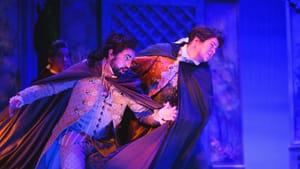Stay in the Loop
BSR publishes on a weekly schedule, with an email newsletter every Wednesday and Thursday morning. There’s no paywall, and subscribing is always free.
Get me to the church on time!
OperaDelaware presents The Marriage of Figaro

In The Marriage of Figaro, getting to the church on time has never been more complicated, or more fun. On May 20 and 22, OperaDelaware closes their onstage season with Mozart’s effervescent masterpiece, continuing the tale of Figaro (that factotum of the city) begun earlier this year in Rossini’s The Barber of Seville.
An operatic Neverland
General director Brendan Cooke notes that "through the challenging circumstances of the pandemic, we have all been taking inspiration from Figaro's ability to think on his feet.” In planning its season, the company strove to keep its repertoire on the lighter side. Cooke says they were “also drawn to the idea of presenting two works so closely tied together. It’s not often in opera that we get to present sequels.”
Like other composers, Mozart set Figaro in Spain, which author Will Berger calls “an operatic Neverland where the normal rules don’t apply.” The opera opens on the wedding day of Figaro (Efraín Solís) and Susanna (Robin Steitz). They work for Count Almaviva (Sean Anderson), whose wandering eye is fixed on the bride-to-be as he plans to revive a feudal law allowing him to bed her. Furious at discovering this, Figaro, Susanna, and the Countess (Toni Marie Palmertree) devise an intricate plan to outwit Almaviva. Adding to its forward motion, the entire opera plot transpires in 24 hours.
When he relocated to Vienna, Mozart had written several unsuccessful operas and was casting about for a story to impress that musically sophisticated audience. Though other composers had based operas on Beaumarchais’s controversial 1778 play La folle journee (The mad day)—banned throughout Europe for anti-aristocrat overtones—Mozart approached Viennese court writer Lorenzo da Ponte for a new libretto. They began writing in October 1785, working in secret because of the controversy swirling around the play. Da Ponte removed much of the offending material, and Figaro was completed in six weeks. When Emperor Joseph II allowed the opera to open at Vienna’s Burgtheater on May 1, 1786, Mozart was at the keyboard.
In his online pre-show talk, Towson University music professor Aaron Ziegel likens the opera’s imaginative libretto, intricate orchestration, and tuneful arias to a classic song-filled Broadway show. Though this four-act work is now a repertoire classic, in its time it was remarkably innovative, forward-thinking, and musically complex. The Act II finale features 20 minutes of uninterrupted singing (by eight of the opera’s 11 characters), one of the longest and most intricate pieces of music Mozart composed.
A familiar cut
Maestro Anthony Barrese (the company’s music director) is no stranger to the work, having conducted it at Sarasota Opera and at Opera Southwest, where he’s artistic director and principal conductor. Stage director Dean Anthony has “been blessed to live in this opera for 30 years,” performing or directing Figaro 20 times. “These characters are strong, complex, and require an immense amount of craft,” both as singers and actors. On directing the production: “It's incredibly important for me to watch, listen, and shift as we venture through. It's a wonderful journey to take, and I learn as well.”
The full cast features some OperaDelaware regulars, including Anderson, but Solís, Seitz, and Palmertree will be making their company stage debuts at the Grand. The singers “road-tested” a few of Mozart’s delicious arias at a recent 30-minute concert (presented by Wilmington’s Market Street Music) with Aurelien Eulert at the piano, and they had such fun that it was easy to imagine their onstage hijinks. And in a surprise casting move, director Anthony has tapped Cooke (a former operatic baritone) to step back on stage in the character role of the gardener Antonio.
What, When, Where
The Marriage of Figaro. Music by Wolfgang Amadeus Mozart, libretto by Lorenzo Da Ponte. Conducted by Anthony Barrese, stage direction by Dean Anthony, with the OperaDelaware orchestra and chorus. OperaDelaware. $29-$99. May 20 and 22, 2022, at the Grand Opera House, Copeland Hall, 818 North Market Street, Wilmington, DE. (302) 442-7807 or operade.org
Masks are required to be worn inside the Grand. At press time, entry to this performance does not require proof of vaccination but check the website for any changes.
Accessibility
All of OperaDelaware's venues are equipped with elevators and are wheelchair accessible. If you or someone in your party requires wheelchair seating or has mobility issues, please notify the box office at 302-442-7807 at the time of your order.
Sign up for our newsletter
All of the week's new articles, all in one place. Sign up for the free weekly BSR newsletters, and don't miss a conversation.

 Gail Obenreder
Gail Obenreder